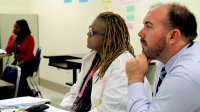How Principals Can Grow Teacher Excellence
At Cochrane Collegiate Academy, teachers credit their principal with helping them continually improve their practice through effective PD, ongoing support, and mutual trust.
At Cochrane Collegiate Academy, in Charlotte, North Carolina, high-quality teachers have been an important part of turning the school around, and many of them credit their principal, Josh Bishop, for helping them reach their full potential. Here are some of the ways that Bishop brings out their best.
1. Provide quality professional development (PD).
By providing the following kinds of PD, you can make sure your staff gets the most out of these sessions:
- Research-based: Let research guide your strategies. Says Bishop, "We're not just looking at the newest fads that come out, but what research shows really works."
- Consistent: Once you find what's working, stick with it. Bishop is intentional about creating a long-term plan for PD and being consistent in the implementation across multiple years.
- Convenient: Cochrane's weekly PD session is held right at the school so that teachers will be more likely to attend. Giving them continuing-education units provides an additional benefit.
- Relevant: Cochrane teachers appreciate that their PD is largely focused on enhancing their school's own instructional model, Interactive Learning, which makes it pertinent to their teaching.
- Differentiated: Just like students, teachers have strengths and weaknesses in different areas, so Bishop provides choices, usually between an instructional approach and a technology approach.
2. Use their time wisely.
Following the flipped-classroom model, Bishop has "flipped" his faculty meetings. Rather than using the time for tedious administrative information, he provides that information in a podcast. This makes it possible to have the faculty meetings be "strictly focused on professional development," according to Bishop.
Providing adequate time for professional development can help improve student performance as well. According to a 2007 review by American Institutes for Research, commissioned by the U.S. Department of Education, teachers who received at least 49 hours of professional development over six to twelve months could be expected to boost their students’ achievement by about 21 percentile points. At Cochrane, teachers have about two and a half hours of PD every week, adding up to close to 90 hours per year.
3. Trust your teachers.
As Bishop explains, "I didn't teach the students to enable the gains we have made here. The teachers taught those students, and so we trust them to make the right decisions, and we support them." That trust also helps teachers feel more comfortable communicating what areas of PD they need to strengthen their skill set.
4. Facilitate, don't dictate.
Just as Cochrane's teachers have seen the value of stepping away from the lectern and letting students take more of a hand in their own learning, Bishop strives to provide his teachers with what they need and then lets them take it from there. Angela Johnson, a ninth-grade English teacher at the school, says, "Mr. Bishop is the ultimate facilitator. He trusts your strengths, and when I go to him, I know that he supports me a hundred percent. If there's something that you don't have access to, he's willing to go the extra mile to get you whatever you need."
5. Model your expectations.
At Cochrane, modeling goes on at every level, and everyone holds himself or herself accountable for walking the walk. For example, Bishop knows that technology is essential but can also be intimidating to some of the teachers. So he tries to make it more accessible by using technology in ways that are easy to learn and replicate. Since he began using podcasts, Bishop says he's noticed a change: "I've seen more and more of my teachers come to me and say, 'Can I borrow a Flip cam? I want to do a quick movie.' And my response always is, 'Sure, do you need some help?'"
6. Expect the best.
Johnson sums it up: "Mr. Bishop holds you to a high standard. He knows what your capabilities are, and he empowers you to be a leader. If you are on the receiving end of the empowerment and the motivation, then you feel like you have no other choice but to rise to the occasion."
Cochrane Collegiate Academy
Enrollment
620 | Public, UrbanPer Pupil Expenditures
$6133 School • $5346 District • $8451 StateFree / Reduced Lunch
87%DEMOGRAPHICS:
20% English-language learners
13% Individualized education programs
